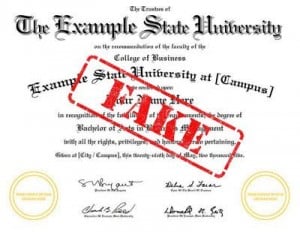|
Getting your Trinity Audio player ready...
|
Fraudsters who lie about their experience and qualifications on their CVs are popping up regularly in South Africa – but it’s entirely possible to prevent these unscrupulous individuals from entering the workplace.
This important responsibility lies with human resource (HR) departments, and it’s a task they can achieve if they do their work properly. This is the message delivered by Aadil Patel, a labour law practitioner who spoke at the 28th annual labour law conference in Sandton earlier in August.
HR practitioners must ask the right questions up front, said Patel, and they must do proper verification of information provided. If they don’t and it emerges that the employee does not, for instance, possess a particular qualification as claimed, they have only themselves to blame.
The insidious practise of CV falsification deprives competent, qualified people from being gainfully employed, Patel said. It also diverts a hefty sum in salaries to people who have neither worked for nor earned such a salary. Whether the employee is in charge of a classroom, a vehicle or a company account, there is great danger in allowing unqualified people to take the reins.
The latest scandal, of many, in South Africa features the head of procurement for the Passenger Rail Agency of South Africa (Prasa), Joseph Phungula.
“The man has been claiming that he has a PhD degree while he hasn’t,” Prasa chairperson Popo Molefe said. “We will try to institute legal action to recover all the money he earned from Prasa using his fake qualifications.”
Phungula has reportedly resigned, but this has not been confirmed. In July Prasa’s chief engineer Daniel Mtimkulu resigned after he too claimed to have a PhD. He was unable to produce proof of the qualification, and was charged with gross dishonesty and fraudulent misrepresentation.
 There are others – Hlaudi Motsoeneng, Ellen Tshabalala, Saxen van Coller, former ambassador to Japan, Mohau Pheko, even the venerable Pallo Jordan. Their names are familiar now not for their achievements in their careers, communities and society at large, but for a more unfortunate reason.
There are others – Hlaudi Motsoeneng, Ellen Tshabalala, Saxen van Coller, former ambassador to Japan, Mohau Pheko, even the venerable Pallo Jordan. Their names are familiar now not for their achievements in their careers, communities and society at large, but for a more unfortunate reason.
This is a worldwide trend that was observed as far back as 2006, according to HR Future magazine. In South Africa, the article noted, such manipulations vary from the “little lie” where a candidate alters the symbols he or she achieved on a matric certificate, to the gross lie where a “degreed” candidate had never seen the inside of a university.
In the last five years, according to local background screening company Managed Integrity Evaluation, this type of fraud has increased by 200%.
The onus is on HR practitioners, said Patel, to ensure that all the necessary background checks are completed before the employee’s date of commencement.
And having found someone out, dealing with the problem is not as simple as firing that person – often the employee with fight back through arbitration. The solution, Patel insisted, is to get it right before the employee walks through the doors.
Popi to complicate background checking
The forthcoming full implementation of the Protection of Personal Information (Popi) Act – only the regulator has been enacted to date – will make the HR task more difficult, Patel cautioned, because it introduces a new element into background checking.
“You can’t look up or obtain someone’s personal information unless you have their consent. How then do we deal with this epidemic?”
Many CVs contain gross qualification or experience misrepresentations. These range from the altering of symbols on certificates and fabricated work histories, to the inclusion of matric certificates, degrees and even doctorates which the candidate or employee has not obtained through honest and legitimate channels.
A report on the culture of dishonesty – fraudulent qualification & falsified curriculum vitae (Quest Staffing Solutions, 2014)
When an employer advertises a vacancy, they will specify minimum qualifications and will require proof of those qualifications, and possibly other information such as the employment, medical, financial or criminal history. This information, and that contained in a CV, falls under the definition of personal information in terms of Popi – but it’s that information that will persuade the employer to shortlist the applicant, or not.
Personal information is obtained in an application form or CV, as well as during the interview or other pre-employment screening processes. The collection, verification and storage of personal information is known as processing.
Employers typically do screening and vetting through integrity checks, a deeds office search, a criminal record check, or a credit check, among others. Before the introduction of Popi, employers were able to do this at will. But Popi, when it’s enforced, will prevent these checks from taking place without permission, as a way of protecting citizens’ information from abuse.
The easiest way to obtain the information is to get the consent of the candidate. This should be made plain in the advert and the application form, and it should be mentioned again in the interview. Written consent should be obtained, and recruitment processes should be amended to reflect this, Patel said.
“If you’re recruiting and someone doesn’t give consent for a personal information check, your alarm bells should start ringing. Don’t interview them.”
HR practitioners create this problem, Patel said, when they don’t complete the integrity checks thoroughly or speedily. The person may have been working for some time, without the checks being completed. If the person is found to have misrepresented their information, the employer can’t simply fire them because there is a process that must be followed.
“This could have been prevented if we had done the recruitment process properly,” Patel said. “We can no longer be robots and work from a template without applying our minds as to the reasons we want information.”
The risk-free approach – ask questions and know the exemptions
But consent is not the only way – the Popi legislation provides a host of provisions and exclusions, listed in sections six and seven. See the sidebar below for examples.
In sections 27 to 33 a number of more specific exemptions are listed. They relate to, among others:
- processing of the data subject’s religious or philosophical beliefs by spiritual or religious organisations, provided that the information concerns data subjects belonging to those organisations;
- processing of the data subject’s trade union membership by the trade union to which the data subject belongs or the trade union federation to which that trade union belongs, if such processing is necessary to achieve the aims of the trade union or trade union federation;
- processing of the data subject’s health or sexual life by medical professionals, healthcare institutions or facilities or social services, if such processing is necessary for the proper treatment and care of the data subject.
There is also a general exemption concerning special personal information, where the prohibition does not apply, for instance, to processing that is carried out with prior parental consent where the data subject is a child and is subject to parental control in terms of the law.
Some of the exclusions listed in Popi include the processing of personal information as part of:
– purely household or personal activity;
– some state functions including criminal prosecutions, national security or public safety;
– literary or artistic purposes, or journalism under a code of ethics that provides for the safeguarding of information sources.
Because the legislation has not yet been implemented, it has not been tested in court, said Patel, and if employers don‘t want to be that first one to test the legislation, they must not rely on the exceptions but rather start to amend their recruiting processes now.
“The risk-free approach is to get your house in order. An employee is under no obligation to disclose any personal information unless asked. That employee is not there to make your job easier – you are HR practitioners, you must probe. If you don’t ask the questions, you can’t later say there is fraud and dishonesty because that employee is not obliged to tell you anything. They only need to tell you what you ask for.”
Happening all around the world
A 2014 whitepaper published by Quest Staffing Solutions reveals the extent of the problem. The paper, titled A report on the culture of dishonesty – fraudulent qualification & falsified curriculum vitae, describes it as a “culture of dishonesty and desperation amongst job seekers.”
The paper mentions causes such as unemployment, an increasingly competitive global job market, limited access to tertiary education, and a sense of entitlement amongst those born between 1982 and 2000, who are now infiltrating the workforce.
While many CVs contain minor faults or inconsistencies, the report noted, others contain gross qualification or experience misrepresentations. “These range from the altering of symbols on certificates and fabricated work histories, to the inclusion of matric certificates, degrees and even doctorates which the candidate or employee has not obtained through honest and legitimate channels.”
Such fraud is not only committed by entry-level employees, the report said, but across the board.
The situation is no different in many other countries, and the business of qualification fraud is lucrative and growing. India, the US and the UK are actively gathering data on the phenomenon.
The repercussions for perpetrators can be severe – ranging from jail time and warnings of such punishment, to loss of reputation and credibility and diminished job prospects.








